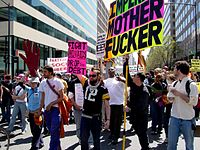This is an old revision of this page, as edited by 64.4.141.196 (talk) at 18:02, 21 April 2006 (→External links: linked to map of important protests). The present address (URL) is a permanent link to this revision, which may differ significantly from the current revision.
Revision as of 18:02, 21 April 2006 by 64.4.141.196 (talk) (→External links: linked to map of important protests)(diff) ← Previous revision | Latest revision (diff) | Newer revision → (diff)



Protest expresses relatively overt reaction to events or situations: sometimes in favor, though more often opposed. Protesters may organize a protest as a way of publicly and forcefully making their opinions heard in an attempt to influence public opinion or government policy, or may undertake direct action to attempt to directly enact desired changes themselves.
Self-expression can, in theory, in practice or in appearance, be restricted by governmental policy, economic circumstances, religious orthodoxy, social structures, or media monopoly. When such restrictions happen, grumbles or interior opposition may spill over into other areas such as culture, the streets or emigration.
A protest can itself sometimes be the subject of a counter-protest. In such a case, counter-protesters demonstrate their support for the person, policy, action, etc. that is the subject of the original protest.
Historical examples
Unaddressed protest may grow and foster dissent, activism, riots, insurgency, revolts, and political and/or social revolution, as in:
- Northern Europe in the early 16th century (Protestant Reformation)
- North America in the 1770s (American Revolution)
- France in 1789 (French Revolution)
- United States of America (for example the Stonewall riots (1969) or the Haymarket riot (1886))
- Tiananmen Square Massacre in 1989
- Anti-globalization Protests in Prague in 2000
- Serbia in 2000
- Argentina in 2001 (December 2001 Riots, Cacerolazos)
Forms of protest
Recognized forms of protest include:
- Boycott
- Bully pulpit
- Civil disobedience
- Some cases of culture jamming and graffiti
- Demonstration or rally
- Die-in
- Flag desecration
- Letters: Letter writing campaigns, letters to the editor,…
- Literature and art - such as the 13th century Spanish tale "The Emperor Has No Clothes"
- Occupation
- Peace camp
- Petitions
- Picketing
- Protest march
- Protest rally
- Protest song
- Public nudity
- Certain classes of publicity stunt
- Raasta roko
- Rent strike
- Riot (sometimes protests lead to riots)
- Satyagraha (non-violent protest)
- Samizdat and zine
- Self-immolation
- Sit-in
- Sitdown strike
- Soapboxing
- Strike action
- Tax resistance
- Teach-in
- Formation of a Tent City
- Topfree
- Walkout
See also
- Action on climate change
- Anti-globalization movement
- First Amendment to the United States Constitution
- May 1968
- Protests against the 2003 Iraq war
- Tiananmen Square protests of 1989
- UK fuel protests
- France Protest
Usage in American English
In American English, the verb protest often acts transitively: The students protested the policy. Elsewhere one can still find intransitive usage: The students protested against the policy; or: The students protested in favor of the policy.
External links
- Essay examining ICTs and protest
- High-tech protest at the 2004 Republican National Convention
- Parenting Versus Protesting: Are They Mutually Exclusive?
- Is There A Legal Age for Political Dissent? Teens at Protests!
- France Protest against Anti-Job Law
- East Fife Football Club Supporters' Protest against chairman Brown
- Important Protests Mapped on Platial.